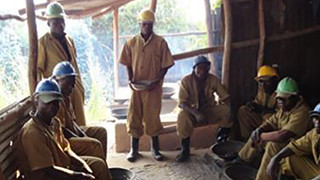In Western Province of Rwanda, the iTSCi mineral traceability system is enabling miners like Jean Bosco Mbarushimana to earn better incomes from mining activities and provide a better life for themselves and their families. Jean Bosco, a team leader at the COMINYABU cooperative, did not have an easy start in life. At three years old he became an orphan and homeless. An elderly woman took him in and raised him but living conditions were tough. Mining was one of the few economic opportunities open to young people in the area. He started mining when he was 19 years old.
Before his mine came into the iTSCi system, Jean Bosco saw a lot of mineral fraud. After a day’s work, some of his team members would sneak off to sell their minerals to a buyer of their choice. Their team ended up losing profit.
Since the Rwandan Government began implementing the iTSCi system early last year, control of the sector has greatly improved. Each of Jean Bosco’s ten team members now registers his daily production, and the minerals are tagged and recorded in logbooks by Government officials. As the teams in the COMINYABU cooperative have improved their organization to comply with iTSCi system requirements, they have seen their production increase by 50-75%. Each miner’s income has increased accordingly.
Thanks to his mining income, Jean Bosco has bought land in seven different places, built his own house and got married at the age of 25. The cooperative contributed to organize his wedding ceremony. He has two children and six other family members depend on his work.
Jean Bosco is currently attending evening classes to learn how to read and write. To be a more effective team leader, he wants to be able to record his team members’ names and production himself. In Jean Bosco’s words “the miners in our cooperative want to celebrate the first year of the traceability system in Rwanda because we want to re-member the positive changes we have seen”.

Jean Bosco Mbarushimana and his team in the COMINYABU cooperative.
